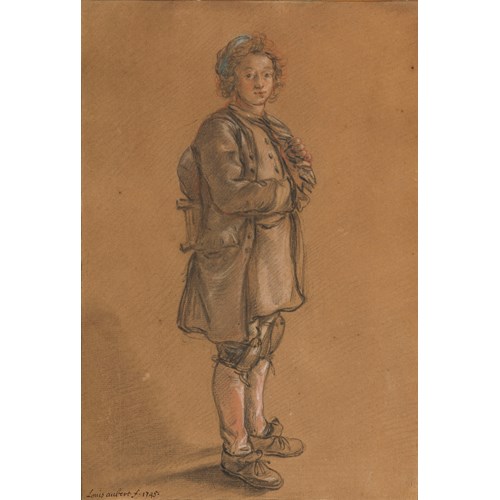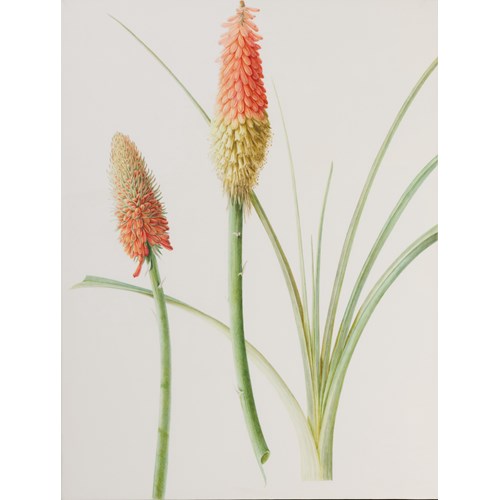Walter Richard SICKERT
Portrait of Giovanni Boldini
Date 1890
Period 1850-1900, 19th century
Origin Germany, England
Medium Pen, Black ink
Dimension 22.2 x 16.9 cm (8³/₄ x 6⁵/₈ inches)
As the Sickert scholar Wendy Baron has noted of the artist's drawings for The Whirlwind, 'They are mostly half- or bust-length pen and ink drawings in which Sickert's main concern was to catch a good likeness.' The fourteen portrait drawings for The Whirlwind depicted politicians, lawyers, civil servants and writers; each was drawn in pen and ink, and all were autographed by the sitter as well as being signed by the artist. Sickert's only other Whirlwind drawing of a fellow artist, however, was an informal portrait of his good friend Jacques-Émile Blanche, seated and holding his dog, which is today in a private collection. Other Whirlwind portrait drawings by Sickert are today in the collections of the Hunterian Art Gallery in Glasgow, the Walker Art Gallery in Liverpool and the Museum of Modern Art in New York, as well as in several private collections.
Three years later, in 1893, Sickert published a small number of similar pen and ink portrait drawings in The Pall Mall Budget, including a stylistically comparable study of the French journalist and politician Henri Rochefort, also signed by the sitter, that is today in the Witt Collection at the Courtauld Gallery in London. Also comparable is a pen and ink portrait drawing of Aubrey Beardsley of c.1893-1894, in the collection of the National Portrait Gallery in London. Other portrait drawings by Sickert also appeared in The Yellow Book and The Cambridge Observer, while from 1897 onwards he also produced a series of caricature portraits for Vanity Fair. Sickert's use of pen and ink for his portrait drawings of the early 1890s had given way, by 1894, to a preference for black chalk. Yet whatever his choice of medium, as Baron has written, his portrait drawings invariably display 'Sickert's talents for the swiftly drawn likeness [and] his ability to capture and slightly caricature the most striking physical attributes of his subjects.'
Giovanni Boldini (1842-1931) had, from the earliest years of his career, displayed a remarkable talent as a portrait painter. By 1871 he had settled in Paris, where his bold, fluid style of painting was to prove immensely popular. Although he produced genre paintings of elegantly dressed women portrayed in lavish interiors, he soon developed a formidable reputation for his dazzling, elegant society portraits of the fashionable women of Paris. Working from a grand studio on the Boulevard Berthier in the 17th arrondissement, previously occupied by John Singer Sargent and Alfred Stevens, Boldini rose to a position of prominence in Parisian art circles, and by the turn of the century had become the most sought-after portrait painter in the city. As Sickert recalled of him, writing in 1910, many years after their first acquaintance, 'Boldini is the non-pareil parent of the wriggle and chiffon school of portraiture…the Franco-Italian master has three sturdy sons, Sargent, Blanche, and Helleu, and…none of them quite succeed in the bravura of the décolleté like their master. None of them has lifted the fashionable flic-flac to the nth with the same ring-master's flourish of the lash as has the wizard of Ferrara and the Boulevard Berthier. His virtuosity and vitality are astounding. An artist can only interpret what inspires him, and his sitters do not bore Boldini.'
Date: 1890
Period: 1850-1900, 19th century
Origin: Germany, England
Medium: Pen, Black ink
Signature: Signed and dated Sickert.1890. at the upper right.
Autographed by the sitter Boldini at the lower right.
Dimension: 22.2 x 16.9 cm (8³/₄ x 6⁵/₈ inches)
Provenance: Reid Gallery, Guildford, in 1970.
Literature: The Whirlwind, 13 December 1890, p.169; Carlo Ragghianti and Ettore Camesasca, L'opera completa di Boldini, Milan, 1970, illustrated p.83 (as signed 'Sidbert[?]'); Wendy Baron, Sickert, London, 1973, p.306, under no.52; Giorgio Ruggeri, Saette e Carezze di un Ironico Libertino. Giovanni Boldini (1842-1931): Disegni e acquerelli, exhibition catalogue, Bologna, 1980, illustrated p.19 (as by ‘Sidbert’); Wendy Baron, 'Chronology', in Wendy Baron and Richard Shone, ed., Sickert: Paintings, exhibition catalogue, London and Amsterdam, 1992-1993, p.36; Matthew Sturgis, Walter Sickert: A Life, London, 2005, p.180; Wendy Baron, Sickert: Paintings and Drawings, New Haven and London, 2006, p.189, no.57.14.
Exhibition: Guildford, Reid Gallery, Autumn Exhibition of 19th and early 20th Century Paintings and Watercolours, 1970.
More artworks from the Gallery






_T638722088181025454.jpg?width=500&height=500&mode=pad&scale=both&qlt=90&format=jpg)


